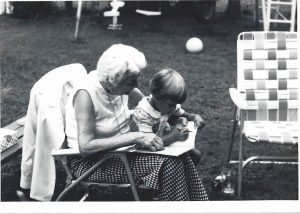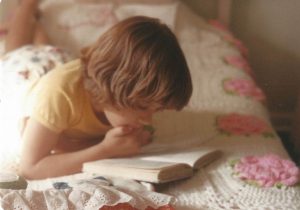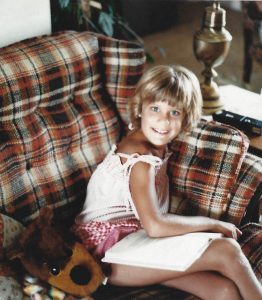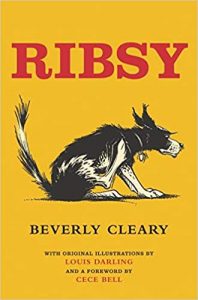I think I was born a reader.
Great Nana and Me circa 1974 (during my brother’s birthday party)
Some of my earliest memories were of my grandmother reading to me, trips to the library, story hour, and pouring over my favorite books. I read before I entered kindergarten (which was a big deal then–not so much anymore). I had a kindergarten teacher, Mrs. Knoller, who realized that there were a few of us who could read, and she rummaged around in the storeroom, found some Dick and Jane readers, and did reading group with us. Now imagine my surprise when I got to first grade and was stuck back in phonics books learning sounds. As a six-year-old, I remember thinking, “Why am I doing this? I already know these things.” Thankfully, I was pulled out for speech, and Mrs. Schuh, realizing I could read, took the time in speech to let me read. I loved being pulled out of class to go read!
Reading on my bed circa 1979 (wish I knew what I was reading)
Reading at Nana and Aunt’s house circa 1980 (during a family party)
In second grade, I had Mrs. Thompson. Like Mrs. Knoller and Mrs. Schuh, she embraced our differences and what made us uniquely us. Even if that meant she had to corral us into compliance every now and again.
I loved second grade. I loved everything about second grade. All these years later, I now realize that most of what Mrs. T did was probably to make her life easier. We were seven and eight-year-olds in a room where learning was exciting and valued. Every day was a day of discovery. One of the things we discovered that year–or at least I discovered that year–was a world of books that spoke to me.
Each day after lunch, Mrs. Thompson would dim the classroom lights and read to us. This is the first (and last time) I remember a classroom teacher reading to us. We were read to during library, but I know we weren’t read to during first grade. And as much as I enjoyed the grades that followed second, we did not have read alouds.
I can still recall some of the books Mrs. Thompson read to us. One was Trumpet of the Swan, which remains to this day a favorite. And another was Henry Huggins. I instantly fell in love with the story and couldn’t wait for more. After she finished reading Henry Huggins to us, I went to the school library and began checking out–one by one–everything the school had by Beverly Cleary about Henry Huggins, which eventually led to me reading everything they had about Beezus and Ramona and then her other books.
I was struck by the characters. They were real to me in ways that Jamie and Claudia Kincaid in From the Mixed Up Files of Mrs. Basil E. Frankweiler were real to me. I had been looking for more characters that were kids like me. These books were teaching me a lesson (at least not in a didactic way). They were humorous. They were real. These were flawed characters. And I loved it!
In her obit, the NY Times states, “With ‘Henry Huggins published in 1950, Ms. Cleary, a librarian by trade, introduced a contemporary note into children’s literature.” And despite the fact that Henry Huggins was 27 or 28 years old by the time I met him, he was still quite contemporary for me. She began writing because she “wanted to read funny stories about the sort of children I knew, and I decided that someday when I grew up I would write them.” And across the generations, her books not only were for her and what she wanted to read when she was a little girl, but they also were the books I wanted to read as a little girl.
And so, Ms. Cleary’s death a few weeks ago caused me to stop and reflect and pause. I needed a way to honor this woman who was such a huge influence in my life. Her books kept me reading. It’s no surprise to me that I fell in love with Anne of Green Gables after falling in love with the kids on Klickitat Street. And even today, I can trace the comfort reads that I love back to the same style as Beverly Cleary’s books. I love character novels written about a community of people who jump off the page and remind me of people I know. The books may not be high brow literature–it might simply be Elin Hilderbrand or Mary Kay Andrews or Jane Green. But there’s comfort in the friendships of the characters found on the pages of the novels. The same friendships and humor found in Cleary’s books.
I wasn’t sure if her writing still help up in the 21st Century. After all Henry Huggins, who was in in third grade in 1950, now collects social security, is eligible for medicare, and probably has an AARP card (not to mention I’m sure he was in the first round of COVID vaccines after health care providers). I’m sure I have Ramona Quimby Age 8 sitting on my bookshelf, but I wanted to read something that I read when I first discovered Ms. Cleary, 40+ years ago. I happened to have a Weekly Reader Book Club Edition of sitting on my shelf. Ribsy was a book I read back in second or third grade. So I picked it up. Excited and yet a bit afraid of what I would find. What if the books didn’t stand the test of time.
What I found was that Ribsy stands the test of time.
First, she captures Ribsy’s personality so beautifully. As I got lost in the pages of the book, I was reunited with Ribsy once again. I realized how much I missed that dog. One of the things I loved about the book was that the reader was fully aware of everything that was going on in the story even though Ribsy and Henry didn’t. In this way, not only does Cleary introduce the reader to dramatic irony, but she also trusts the reader not to talk down to them. She trusts them enough to let them in on the secret, and by doing this, she further engages them in the story.
Another thing I noticed was how much commentary on life there is in this novel. Whether it’s how people treat Ribsy or how they treat each other, she’s showing her readers the most important thing is to treat everyone and everything the way you wish to be treated. (And she’s not lecturing the reader about it–we’re just following Ribsy on his quest to get home.) Ribsy knows how can and can’t be trusted, and he teaches the reader this. Ribsy has a lot of experiential knowledge (duh–he’s a dog). And this knowledge makes him really smart and helps him figure out how to get back to Henry. In this way, Ribsy shows kids they are smart too–not because they’re learning from books or getting high marks on tests but because they can learn by doing. He’s showing readers the value in experience.
And Ribsy is also a great introduction to the hero’s journey, which will definitely come in handy when readers of Cleary have to slog through Freshman English in high school (with no disrespect to Freshman English teachers–it’s just that the Odyssey isn’t as accessible as Ribsy is).
The kids in the novel have voice and agency. Henry speaks up about not wanting to replace Ribsy and his parents listen. He calls and asks to speak to Joe to try to get Ribsy back–not his parents. The negotiation happens between the kids, which was so refreshing to read. There are no snow plow parents pushing the difficult things out of the way for the kids. They have to figure out how to navigate life’s challenges–with parents there as support. He suggests to his parents they drive around Joe’s neighborhood to try to find Ribsy, and his parents listen. The kids in the novel were just ordinary kids living in an ordinary neighborhood trying to figure out life. And despite some things (like the cost of food or treats) being a bit outdated (or Ribsy’s dog food not being quite up to the swanky dog food standards of today), the overall character and plot development holds up.
I enjoyed being able to go back to Klickitat Street and find it just as left it 40 years ago. This reread showed me I could go home again.
I am not the writer Ms. Cleary was, and I lack the wordsmithing abilities to say how truly grateful I am that she took the time to put her stories down on paper. Her work and her words made me the reader I am today. I know without her books, I probably would have drifted away from reading before I ever fully got started. Wherever you Ms. Cleary, thank you.









